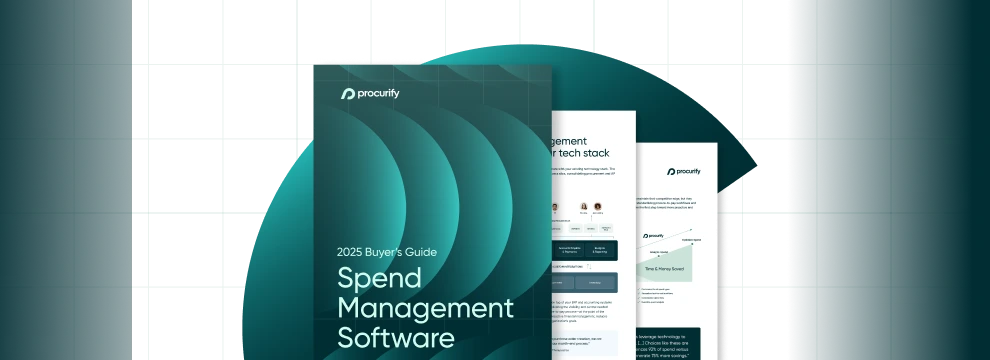Leading a Remote Team With Shouvik Roy, CFO at Drop
One benefit of working in tech (besides the relaxed dress code and the pool table in the lobby) is a company culture built around using apps and technology to improve workflow. Shouvik Roy became CFO at Drop, a mobile rewards platform, in August 2020. It was an especially challenging time to join a new company, and Shouvik’s first priority was leading a remote team through the COVID-19 pandemic.
Here’s what Shouvik had to say about leading a remote team during COVID-19.
Introducing Shouvik Roy, CFO of Drop

💵 What he does: Chief Financial Officer at Toronto-based rewards app Drop.
💡 Key quote: “I’m most proud of my ability to build teams. I’m really proud that I’ve had a lot of success with giving my teams opportunities to improve, develop and get promoted, and in some cases, go on to lead finance teams of their own.”
👋 Where to find him: LinkedIn
Listen to the episode here
Listen to Spend Culture: Stories of CFOs and Company Culture
Episode summary
In this episode of Spend Culture Stories, Shouvik explains how Drop’s tech stack is helping it mitigate productivity drops caused by COVID-19. He also explains Drops plans for the future and how the company looks out for its employees, emphasizing why finance teams should be custodians, not police.
Shouvik says that like most tech companies, Drop was better equipped to handle remote work. This is because it had already embraced tools like Zoom, Slack, and cloud-based accounting software.
“It wasn’t a huge change. Those things are probably a lot more challenging for legacy businesses who typically haven’t used them,” he says.
Before Drop, Shouvik worked on two tools that have helped move financial operations from paper to screen for thousands of businesses. He was Director of Finance at Freshbooks and then CFO at VersaPay.
According to him, “Gone are the days of having an on-premise accounting ERP system. Everyone’s moving to solutions like NetSuite, Xero, obviously my alma mater FreshBooks. Everything is going to become cloud-based.”
Watching the pandemic speed that process up is, Shouvik thinks, a rare positive has shown itself: “It will make our lives a lot easier and free up some time for us to actually focus on more value-added things.”
A few months into his role at Drop, and with a clear eye on the challenges ahead, Shouvik explains where he’s spending, where he’s saving, and where he wants Drop to go.
Top takeaways from this week’s conversation
COVID-19 doesn’t mean slashing your budget. Continue to provide for your employees 🤲
Just because your physical office is now empty, it doesn’t mean you’re off the hook for your employees’ work-related expenses.
“We spend a lot of money on people when they’re in the office, so there’s been a bit of cost-saving there,” Shouvik says. “But we redeployed some of those savings back to the employees, because we want to make sure that they’re comfortable in their homes.” That includes covering the cost of proper chairs, desks, and rising phone bills.
Drop has also made the effort to create a virtual office during remote work to help better lead a remote team — something that Shouvik appreciated. For example, he says, “We introduce people at weekly company town halls, we have company-wide virtual lunches so you can meet all the new hires, and we have virtual social events on Thursday evenings.”
While the CEO sells the vision, the CFO ensures the numbers are solid 💯
Having steered FreshBooks through a Series B round and VersaPay through an acquisition, Shouvik has firsthand experience of how the dynamic between the CFO and CEO comes into play when a company is looking to convince a third-party to part with cash.
“The role of the CFO is right up there with the CEO, because the CEO is the visionary — the one setting the stage — but the CFO is there making sure that the numbers and the story are credible,” Shouvik says.
Drop “had an incredibly strong year” in 2020, which means the company might be looking to raise another round. Shouvik says that his main purpose right now is taking on the heavy lifting required of fundraising to free up CEO Derrick Fung’s time.
“He was spread too thin; he didn’t have enough bandwidth to be involved in everything,” Shouvik says. “That’s where I come in, as an experienced leader, to run the things he no longer has the capacity for while he focuses on more key visionary opportunities for the company.”
CFOs should act as financial guardians, not the finance police 😇
Unfortunately for all our forecasting models, we don’t live in a world where companies always run according to budgets and agendas laid out by CFOs.
Instead of building a spend culture around strict rules, Shouvik recommends building it around the understanding that there will always be a surprise or emergency that needs accommodating. Being as flexible as possible is important when this happens.
“The role of finance is not to be the police, but to establish guardrails,” Shouvik says. “Build a culture around best practices, and go about business strategically rather than always thinking about the short-term financial impact.”
For example, Drop recently needed to hire some engineers that hadn’t been budgeted for. “If you look strictly through the financial lens, you would say, ‘No, we can’t afford it.’ But as a financial leader, you say, ‘How can we not afford it? If we don’t do this, it might put the company in a bigger predicament.’ Sometimes you have to spend money to make money.”
Top highlights from the podcast
How finance ties into every aspect of the business
[1:52] “I look at myself not just as a finance leader but as a business leader. I think that comes with experience, and it’s also the advantage of finance, because we touch so many different areas of the business. We’re not just focused on one particular area — if it’s a product or engineering or even people, finance usually gets involved in some sort of decision-making.”
It’s communication, not tax knowledge, that make a good finance leader
[2:31] “Being a good finance leader has very little to do with being good at math or accounting. It’s really being an excellent communicator and a quick learner, having amazing organizational skills, and being able to quickly quantify the impact of business decisions — and having the confidence and conviction to stand by those decisions. Those soft skills are more difficult than the hard skills around finance or capital markets and tax and things like that.”
A virtual ‘welcome’ mat is not the same
[4:38] “Joining a new company is always a challenge, regardless of COVID. You’re meeting new people, you’re learning about how things are done, different deals or partnerships that were signed before your time. You have to be a sponge for the first 90 days or so to get a good grasp of the business and how things work. During COVID, it gets amplified. You don’t have those normal resources around you. In a normal situation, you just spin your chair around and ask somebody a question, or meet somebody in the lunchroom, or grab a coffee with somebody. Everything is scheduled now, so those organic conversations are hard to have: that’s obviously a challenge.”
How COVID-19 has accelerated fintech
[24:28] “Finance is already moving down the path of automation. What we were doing at VersaPay, which was in the accounts receivable automation space, was converting people from the old paper invoice process: stuffing envelopes, sending out invoices to customers, and customers then writing a check. And that check getting lost in the mail! That whole process was such a hard task, but when COVID hit, all of a sudden every company’s accounts receivable team is sitting at home, their accounts payable team is at home. How do you get paid? How do you send invoices? These issues have culminated in companies being forced to expedite their automation.”
No major professional regrets, only gratitude
[35:58] “I don’t have regrets. … I would have loved to have spent some time abroad earlier in my career — working internationally would have been a great experience. It’s harder to do later in life. … That’s a very small thing. I’ve been quite happy with the decisions I’ve made in my career and how things have evolved. I’ve been quite fortunate, I don’t want to sound ungrateful for any of that.”
Our favorite quotes
[11:03] “Maybe because Drop is an app geared towards consumers saving money, I think the staff likewise can appreciate the value of a dollar. Employees have a sense of pride and ownership in the company, so a wasted dollar here feels like it’s a waste of a dollar for them personally.”
[15:06] “Whether it’s an acquisition or raising funds, the key is credibility. When you’re presenting the business, you have to ask, ‘Is the story credible?’”
[33:44] “For Drop and most startups, cash is king. You want to make sure you have enough cash runway to get through any difficult times, and monitor cash burn.”
[37:27] “I feel everything happens for a reason, even when you think something didn’t turn out your way. There are jobs I’ve applied for that I never got, and I thought, ‘Oh, man that really sucks. My life is over.’ But things worked out. I’m here at Drop now, so it couldn’t be any better.”
This interview is taken from an episode of the Spend Culture Stories podcast.
That’s not all, folks
If you’re interested in hearing more stories from other forward-thinking executives, you may enjoy these Spend Culture episodes:
- Ryan Lazanis of Future Firm: Forward-thinking accountants in the new normal
- Nilly Essaides from The Hackett Group: Measuring the impact of finance digital transformation
For more tips on remote work practices for accounting teams and finance leaders, check out:
Subscribe and help us grow
Did you enjoy the podcast? Subscribe to the Spend Culture podcast on Spotify, Apple Podcasts, or wherever you listen to podcasts. If you have an extra 10 seconds, please leave us a rating or review to help us grow. Have recommendations for future podcasts? Contact our host at dani.hao [at] procurify.com.
